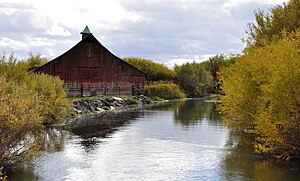| Silvies River | |
|---|---|
 View from Oregon Route 78 bridge near Burns | |
| Location | |
| Country | United States |
| State | Oregon |
| County | Grant and Harney |
| Physical characteristics | |
| Source | Aldrich Mountains |
| • location | Grant County |
| • coordinates | 44°07′19″N 119°13′53″W / 44.12194°N 119.23139°W[1] |
| • elevation | 5,598 ft (1,706 m)[2] |
| Mouth | East Fork and West Fork distributaries |
• location | south of Burns, Harney County |
• coordinates | 43°34′05″N 119°02′04″W / 43.56806°N 119.03444°W[1] |
• elevation | 4,150 ft (1,260 m)[1] |
| Length | 119 mi (192 km)[3] |
| Basin size | 1,273 sq mi (3,300 km2)[4] |
| Discharge | |
| • location | above diversions on the lower river[3] |
| • average | 185 cu ft/s (5.2 m3/s)[3] |
The Silvies River flows for about 119 miles (192 km)[3] through Grant and Harney counties in the U.S. state of Oregon. The river drains 1,273 square miles (3,300 km2) of the northern Harney Basin.[4][5]
The headwaters are on the southern flank of the Aldrich Mountains, about 10 miles (16 km) south of Mount Vernon in Grant County. Named tributaries include Bear Creek and Emigrant Creek. The Silvies runs generally southward and passes near Seneca and Burns. Southeast of Burns, in Harney County, the river splits into two distributaries, the East Fork Silvies River and the West Fork Silvies River. Both terminate at Malheur Lake about 25 miles (40 km) southeast of Burns.[6]
Flowing mainly through private land with limited public access, the river supports populations of redband trout, especially on its upstream reaches. Downstream of Seneca, fish such as smallmouth bass, yellow perch, and carp are more abundant. The pool behind Five-Mile Dam, about 5 miles (8 km) north of Burns, is used for swimming, canoeing, and fishing.[7]
- ^ a b c "Silvies River". Geographic Names Information System (GNIS). United States Geological Survey (USGS). November 28, 1980. Retrieved October 24, 2010.
- ^ Source elevation derived from Google Earth search using GNIS source coordinates.
- ^ a b c d Palmer, Tim (2014). Field Guide to Oregon Rivers. Corvallis: Oregon State University Press. p. 254. ISBN 978-0-87071-627-0.
- ^ a b "Silvies – 17120002 8-Digit Hydrologic Unit Profile" (PDF). Natural Resources Conservation Service (NRCS). 2006. p. 1. Retrieved October 24, 2010.[permanent dead link]
- ^ "Silvies River and Tributaries". U.S. Army Corps of Engineers. 2005. Archived from the original (map) on 2011-05-17. Retrieved October 24, 2010.
- ^ Oregon Atlas & Gazetteer (Map). DeLorme. 2008. § 77–78; 81–82. ISBN 978-0-89933-347-2.
- ^ Sheehan, p. 290
